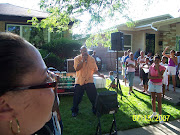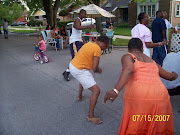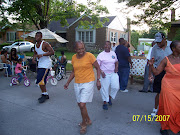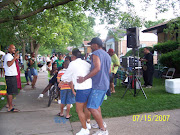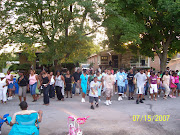...A segment from a conversation between Amy Goodman and the preeminent science fiction writer Octavia Butler (who happens to be of African American descent) from Democracy Now (11/11/05). Here they are reflecting on the relevance of one of her earlier novel for these times:
AMY GOODMAN: Octavia Butler, could you read a little from Parable of the Talents.
OCTAVIA BUTLER: I'm going to read a verse or two. And keep in mind these were written early in the 1990s. But I think they apply forever, actually. This first one, I have a character in the books who is, well, someone who is taking the country fascist and who manages to get elected President and, who oddly enough, comes from Texas. And here is one of the things that my character is inspired to write about, this sort of situation.
She says:
"Choose your leaders with wisdom and forethought. To be led by a coward is to be controlled by all that the coward fears. To be led by a fool is to be led by the opportunists who control the fool. To be led by a thief is to offer up your most precious treasures to be stolen. To be led by a liar is to ask to be lied to. To be led by a tyrant is to sell yourself and those you love into slavery."
And there's one other that I thought I should read, because I see it happening so much. I got the idea for it when I heard someone answer a political question with a political slogan. And he didn't seem to realize that he was quoting somebody. He seemed to have thought that he had a creative thought there.
And I wrote this verse:
"Beware, all too often we say what we hear others say. We think what we are told that we think. We see what we are permitted to see. Worse, we see what we are told that we see. Repetition and pride are the keys to this. To hear and to see even an obvious lie again and again and again, maybe to say it almost by reflex, and then to defend it because we have said it, and at last to embrace it because we've defended it."
Tuesday, November 15, 2005
Wednesday, November 09, 2005
Youth Connecting Despair Across the Globe
This is an excerpt from a discussion that took place on Democracy Now this morning with Amy Goodman interviewing several writers, academics and activist on France's current unrest.
The following is a quote/perspectives shared by Julia Wright, activist in France and daughter of famed American writers Richard Wright. Here Wright is reflecting on the words of a young man weeks before the fires began:
Wright states:..."And I still feel eerie, because as I work with youth, 20 years -- 20 days before that happened, I asked one of the youths who's very gifted to write a statement on how he felt.
Could I read the first five lines of that statement?
AMY GOODMAN: Yes. Go ahead.
JULIA WRIGHT: "I am 20 years old, and I don't want to survive here. From death row to the prison of Abu Ghraib, from Baghdad to New Orleans, from Chicago's Southside to the French hoods, here, over there where you are, chaos. We're no political spinners. We're just voices, live from the street where we live, where we become wise, where we are duty-bound to take control out of respect for those who are prevented from setting foot in it. That very street I visualize without peace stones."
This is a 20-year-old. He wrote this on the first of October. The two kids burned to death on the 28th of October. And the suburbs have been burning since.
The following is a quote/perspectives shared by Julia Wright, activist in France and daughter of famed American writers Richard Wright. Here Wright is reflecting on the words of a young man weeks before the fires began:
Wright states:..."And I still feel eerie, because as I work with youth, 20 years -- 20 days before that happened, I asked one of the youths who's very gifted to write a statement on how he felt.
Could I read the first five lines of that statement?
AMY GOODMAN: Yes. Go ahead.
JULIA WRIGHT: "I am 20 years old, and I don't want to survive here. From death row to the prison of Abu Ghraib, from Baghdad to New Orleans, from Chicago's Southside to the French hoods, here, over there where you are, chaos. We're no political spinners. We're just voices, live from the street where we live, where we become wise, where we are duty-bound to take control out of respect for those who are prevented from setting foot in it. That very street I visualize without peace stones."
This is a 20-year-old. He wrote this on the first of October. The two kids burned to death on the 28th of October. And the suburbs have been burning since.
Tuesday, November 08, 2005
Mourning France's Hip Hop Generation: Further Reflections
Evening everyone:
Greetings from Nicole Anderson in Los Angeles. I sent an early version this to some friends and family last weekend...and just thought I would also send this along to my extended HH family...
Writing to bear witness and survive these times,---Nicole
------------------------------------------------------------------------------------------------
I must start at my own beginning. I am African American sistah born and raised on Chicago's South Side. However, as my dissertation research in Islamic West Africa dictated, I spent most of the late 1990s shuttling between Senegal, Guinea and France. And most recently, I was in
Paris for several months at the end of 2003/early 2004 finishing some of my research some of which looks at the African immigration to France during the 1960s and 1970s.
During my 2004 stint in Paris, I often spoke withAfrican and Arab French about racism,discrimination, and the vulnerability/invisibility ofthe people of color in France.
My boyfriend---a fellow African American brutha who came over to visit during my research stay---would laugh when he would come and meet me at different spots---cafe, cyberspot, archive. Inevitably, he would find me in the center of a debate with folks arguing about race relations in France. There she goes again, he'd sigh! He couldn't follow the French at all point, but he could tell from the crowd and my body language what we were addressing.
Seriously, though, in the same heated, impassioned conversations, they would ask meabout race relations in the US, about the US post9/11 and talk about how much further along BlackAmericans were then they were. Many lamented theimpossibility of life in France for non-whites.
For me, learning about the experiences of folk ofcolor in France was vitally important---because aslong as I was on the street, in the subway, tryingto get into archives, grocery shopping, taking Africandance with West Africans or meals withAfrican, Arab and Caribbean colleagues, my experience was deeply connected to the lives of folk of color inParis.
And yet, I occupied this complicated place---as a BlackAmerican. I occupied this priveledged post as an Americanresearcher moving with fluidity fromFrench research centers to my lil' apartment inthe heart of Paris...and yet I deeply invested inknowing about the lives of those folks---varying shades of brown and black--- who I only saw depicted on TV during the crime reports on the evening news.
Even though African Americans in Paris get to occupy a different kind of space---asBlack elites from another global West (wealthier,educated, artists, intellectuals, captains ofindustry),I was still concerned with theexperiences of folks on the margins in France. Living a life in America fighting from themargins connects me ---for better and for worse---with strugglewhereever you see it.
And the real for me in Paris was this: once you
get beyond tourist Paris, working and living in the neighborhoods as a young black female meant that I was perceived just one more Black immigrant in a nation hostile to folk like you on French soil.
I was as American as the documents I could produce to prove it. Thus,my passport was the only thing that could help me if something jumped off...and what a tenous space that was to occupy!So depending on the tensions in the country at aparticular moment---and whether or not Black andBrowns are being stopped on the streets for theiridentity papers/rounded up/arrested/etc.,.-- I had to be prepared to prove my American-ness at any moment.So while I was there to get the research done, I was also constanlylistening to the news, talking with contacts and reading the paper for anyhints of trouble/unrest.
The other reality is that we people of color inAmerica know this story. France had no problemextracting the resources of French North/WestAfrica/the Caribbean( raw materials, labor, land andmillions of Africans to fight in both of France'sworld wars) during the late 19th and 20th centuries.
However, when those same folks---many who showed up from predominantly Muslim North and West Africa---showed up on France's doorstep looking foropportunities for a better life in their formercolonial motherland, France became increasinglyhostile to them. Few could accesseducation, decent housing, religious freedom and hopefor a life in France free of religious or racialdiscrimination.
More to the point, French hip hop came out of these very same communities now expressing their outrage at systemic neglect.
So, now as the sun sets on 2005, I sit this week watching Paris burn.
And I feel that heavy ache inside. I fear another generation of Blackand Brown youth who will be separated from their families, incarcerated, detained, killed, lost, demonized, scapegoated, and folded into the global war on terror. I hurt for the parents up tonight wondering where their sons are...for elders whose children and grandchildren will pay a heavy price for this.
...And all because they got tired of waiting, ranout of hope and decided to unleash the fires burningwithin them.
This is indeed a reminder of what happens when hopelessness catches fire across a nation.
It is also a sobering reminder to us of the French wing of the Hip Hop generation---who have moved beyond booty-and-bling-a-thons (for the last 12 nights in any case)---to get in the streets and fight for some basic human rights.
Don't get me wrong: I do not celebrate this at all, but recognize the pain that has fuelled these fiery nights.
Thank you in advance for you patience. I just needed to offer this up on this evening.
Mourning the continued war against the poor of color in the West and asking you to send prayers-energy-good will to all who suffer tonight in your families and hometowns and hometowns across the globe tonight.
Take good care, yall!
---Nicole Anderson
----------------------------------------------------------------------
Nicole AndersonIrivne Fellow/Professor of History Occidental College 1600 Campus Road, MC-13 Los Angeles, CA 90041-3314 Office: 323-259-2775 Alternate Email: nanderson@oxy.edu http://diaryofayoungblackprofessor.blogspot.com
Greetings from Nicole Anderson in Los Angeles. I sent an early version this to some friends and family last weekend...and just thought I would also send this along to my extended HH family...
Writing to bear witness and survive these times,---Nicole
------------------------------------------------------------------------------------------------
I must start at my own beginning. I am African American sistah born and raised on Chicago's South Side. However, as my dissertation research in Islamic West Africa dictated, I spent most of the late 1990s shuttling between Senegal, Guinea and France. And most recently, I was in
Paris for several months at the end of 2003/early 2004 finishing some of my research some of which looks at the African immigration to France during the 1960s and 1970s.
During my 2004 stint in Paris, I often spoke withAfrican and Arab French about racism,discrimination, and the vulnerability/invisibility ofthe people of color in France.
My boyfriend---a fellow African American brutha who came over to visit during my research stay---would laugh when he would come and meet me at different spots---cafe, cyberspot, archive. Inevitably, he would find me in the center of a debate with folks arguing about race relations in France. There she goes again, he'd sigh! He couldn't follow the French at all point, but he could tell from the crowd and my body language what we were addressing.
Seriously, though, in the same heated, impassioned conversations, they would ask meabout race relations in the US, about the US post9/11 and talk about how much further along BlackAmericans were then they were. Many lamented theimpossibility of life in France for non-whites.
For me, learning about the experiences of folk ofcolor in France was vitally important---because aslong as I was on the street, in the subway, tryingto get into archives, grocery shopping, taking Africandance with West Africans or meals withAfrican, Arab and Caribbean colleagues, my experience was deeply connected to the lives of folk of color inParis.
And yet, I occupied this complicated place---as a BlackAmerican. I occupied this priveledged post as an Americanresearcher moving with fluidity fromFrench research centers to my lil' apartment inthe heart of Paris...and yet I deeply invested inknowing about the lives of those folks---varying shades of brown and black--- who I only saw depicted on TV during the crime reports on the evening news.
Even though African Americans in Paris get to occupy a different kind of space---asBlack elites from another global West (wealthier,educated, artists, intellectuals, captains ofindustry),I was still concerned with theexperiences of folks on the margins in France. Living a life in America fighting from themargins connects me ---for better and for worse---with strugglewhereever you see it.
And the real for me in Paris was this: once you
get beyond tourist Paris, working and living in the neighborhoods as a young black female meant that I was perceived just one more Black immigrant in a nation hostile to folk like you on French soil.
I was as American as the documents I could produce to prove it. Thus,my passport was the only thing that could help me if something jumped off...and what a tenous space that was to occupy!So depending on the tensions in the country at aparticular moment---and whether or not Black andBrowns are being stopped on the streets for theiridentity papers/rounded up/arrested/etc.,.-- I had to be prepared to prove my American-ness at any moment.So while I was there to get the research done, I was also constanlylistening to the news, talking with contacts and reading the paper for anyhints of trouble/unrest.
The other reality is that we people of color inAmerica know this story. France had no problemextracting the resources of French North/WestAfrica/the Caribbean( raw materials, labor, land andmillions of Africans to fight in both of France'sworld wars) during the late 19th and 20th centuries.
However, when those same folks---many who showed up from predominantly Muslim North and West Africa---showed up on France's doorstep looking foropportunities for a better life in their formercolonial motherland, France became increasinglyhostile to them. Few could accesseducation, decent housing, religious freedom and hopefor a life in France free of religious or racialdiscrimination.
More to the point, French hip hop came out of these very same communities now expressing their outrage at systemic neglect.
So, now as the sun sets on 2005, I sit this week watching Paris burn.
And I feel that heavy ache inside. I fear another generation of Blackand Brown youth who will be separated from their families, incarcerated, detained, killed, lost, demonized, scapegoated, and folded into the global war on terror. I hurt for the parents up tonight wondering where their sons are...for elders whose children and grandchildren will pay a heavy price for this.
...And all because they got tired of waiting, ranout of hope and decided to unleash the fires burningwithin them.
This is indeed a reminder of what happens when hopelessness catches fire across a nation.
It is also a sobering reminder to us of the French wing of the Hip Hop generation---who have moved beyond booty-and-bling-a-thons (for the last 12 nights in any case)---to get in the streets and fight for some basic human rights.
Don't get me wrong: I do not celebrate this at all, but recognize the pain that has fuelled these fiery nights.
Thank you in advance for you patience. I just needed to offer this up on this evening.
Mourning the continued war against the poor of color in the West and asking you to send prayers-energy-good will to all who suffer tonight in your families and hometowns and hometowns across the globe tonight.
Take good care, yall!
---Nicole Anderson
----------------------------------------------------------------------
Nicole AndersonIrivne Fellow/Professor of History Occidental College 1600 Campus Road, MC-13 Los Angeles, CA 90041-3314 Office: 323-259-2775 Alternate Email: nanderson@oxy.edu http://diaryofayoungblackprofessor.blogspot.com
Subscribe to:
Posts (Atom)
